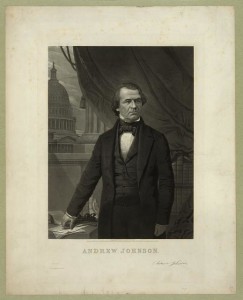From Harper’s Weekly November 21, 1863:
A QUESTION OF ENDURANCE.
THE war has now reached a point at which the continued resistance of the rebels is a mere question of endurance. They are suffering privations as severe as were ever borne by a belligerent people, Their currency is depreciated in the ratio of 12 to 1, and while the soldiers and civil employes of Government are paid in this depreciated currency on the scale which was fair when that currency was at or near par, provisions, clothing, and all the necessaries of life have adjusted themselves to the depreciation, so that it takes a soldier’s wages for a month to support his family for a day. Of manufactured articles—boots, shoes, dry goods, hardware of all kinds, agricultural implements, etc. —the stock has fallen so low that fabulous prices are asked and obtained by its fortunate possessors. The capture of Morris Island has nearly closed the port of Charleston, and within a month the blockade of Wilmington—the only port at which any considerable blockade running is now done—will also be sealed. When this happens, no more foreign goods will enter the Confederacy till the peace. …
This picture is not exaggerated. Yet it is hardly possible to conceive a more complete aggregate of wretchedness. Without food, without clothes, without coal, without hope of succor from abroad, and with the ever-present Federal anaconda tightening its grip round them week by week and month by month, sometimes moving fast, sometimes slowly, but never losing an inch of ground once occupied, can it be possible to conceive a people in more cruel straits than the rebels? Hew long can they endure such a complication of miseries? To which side shall they look for relief? …
[not to Europe, General Lee, General Bragg, cavalry and guerrilla raids, or Northern Copperheads. And after Chattanooga “the next move in the game will be a “resistless “unconditional surrender” movement on Atlanta.”]
They may burn a few trains, “gobble up” a few commissaries, surprise a few helpless detachments of Union troops—nay, even win a pitched battle or two here or there; but what then? In the truthful language of the Richmond Examiner, “Our [rebel] victories are somehow always fruitless and unproductive of results; they leave the great question of the war where they found it.” How long will the rebels continue to struggle under such privations, against such odds, in so hopeless a cause?
The time has not come yet for an honest Northerner to express his opinion of the courage and fortitude which the rebels have displayed in this wretched contest. So long as the red hand of battle is uplifted they are our enemies, whom it is our duty to destroy—nothing more. When the time does come—as come it must—that failure and disappointment and privation and despair compel these poor people to abandon the struggle into which a blind and brutal oligarchy precipitated them, they may rely upon it that, in the words of that great and good man, Henry Ward Beecher, they will find the fatted calf ready for them throughout the North, and none more ready to relieve their wants than the very soldiers who are now crushing in the sides of the pasteboard Confederacy.
_______________________________________
_______________________________________
In those troubled days before the Civil War, … only Andrew Johnson, alone among Southerners [in the U.S. Senate], spoke for the Union. When his train, as he returned home to Tennessee to fight to keep his state in the Union, stopped at Lynchburg, Virginia, an angry mob dragged the Senator from his car, assaulted and abused him, and decided not to lynch him only at the last minute, with the rope already around his neck, when they agreed that hanging him was a privilege of his own neighbors in Tennessee. Throughout Tennessee, Johnson was hissed, hooted, and hanged in effigy. Confederate leaders were assured that “His power is gone and henceforth there will be nothing left but the stench of the traitor.” Oblivious to the threat of death, Andrew Johnson toured the state, attempting in vain to stem the tide against secession, and finally becoming the only Southern Senator who refused to secede with his state. On his return trip to Washington, greeted by an enthusiastic crowd at the station in Cincinnati, he told them proudly: “I am a citizen of the South and of the state of Tennessee. … [But] I am also a citizen of the United States.”
John F. Kennedy wrote quite a bit about Civil War themes in Profiles in Courage[1]
- [1]Kennedy, John F. Profiles in Courage – Memorial Edition. New York: Harper & Row Perennial Library, 1964 (original 1955). Print. page 200.↩

![[Unidentified soldier in Confederate pullover hunting-style shirt with dark military-type trim with double barrel shotgun, revolver, and side knife] (between 1861 and 1865; LOC: LC-DIG-ppmsca-32605)](https://www.bluegrayreview.com/wp-content/uploads/2013/11/32605r-268x300.jpg)
